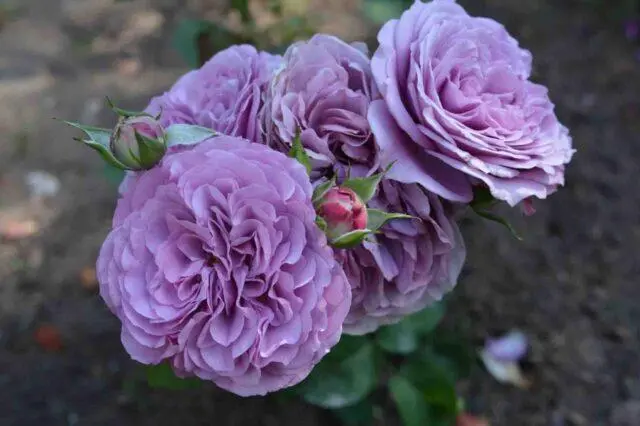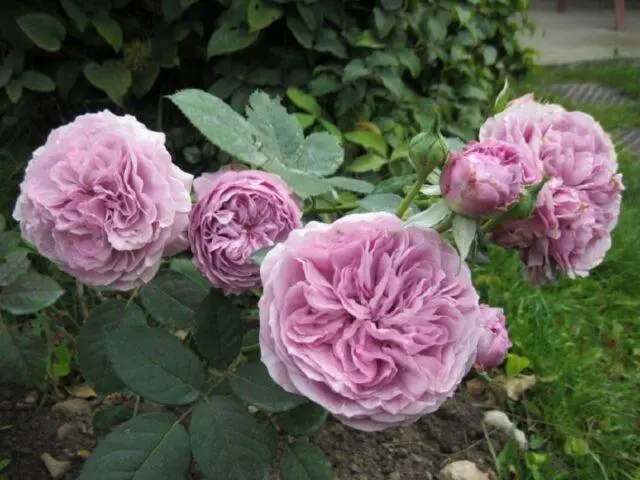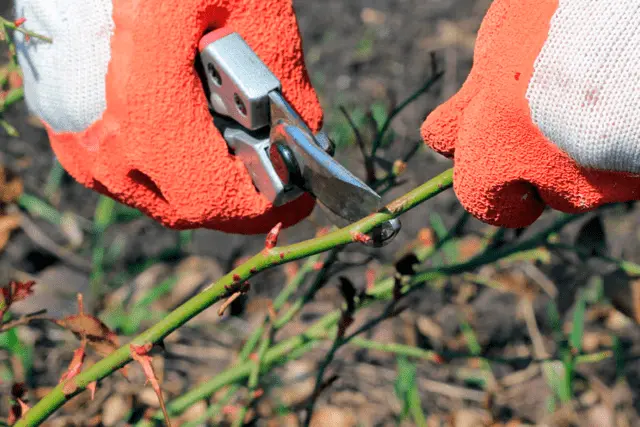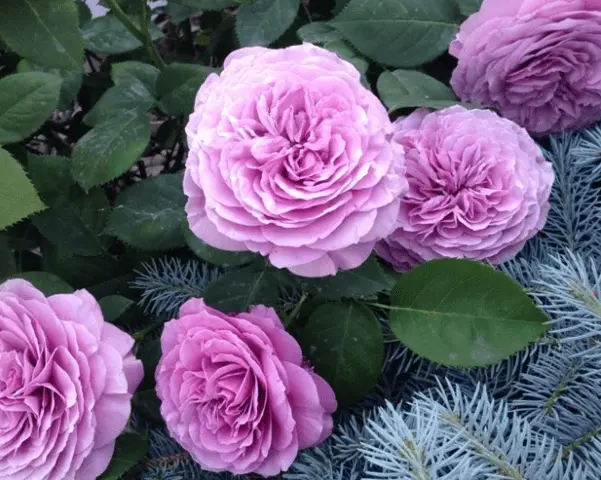Contents
A miniature shrub strewn with large flowers is the dream of many gardeners. And this is exactly the rose Lavender Ice, which can decorate any area. It impresses not only with the large size of the buds, but also with their lavender-lilac color, as well as with an attractive aroma.

Rosa Lavender Ice, due to its compact size, is more suitable for growing in the foreground in a flower bed
History of breeding
In 2008, as a result of the painstaking work of the German breeders of Rosen Tantau, an amazing plant was born that combines two seemingly incompatible qualities – miniature size and impressive bud sizes. And it was a variety of floribunda Lavender Ice (Lavender Ice), which not only looks compact, but also has the original color of the buds. Its soft lavender flowers shimmer in the sun with a bluish-silver tone, which is why it was given the name “lavender ice”.
Description of the rose Lavender Ice and characteristics
Rose Lavender Ice is not without reason referred to as miniature, because the height of the bush occasionally exceeds the mark of 50 cm. Only with good care and favorable climatic conditions can you find a plant that has reached 1 m. In width, it grows up to 60 cm.
There is a moderate amount of green mass, while the leaf plates are not large, but with a pleasant olive tint. The edges are slightly serrated and the surface of the leaves is glossy. Shoots erect, strong, rosette-shaped top. On one peduncle, from two to five buds are formed. Their shape is similar to a saucer, the diameter varies from 7 to 9 cm. The bush is especially beautiful at the peak of flowering, when the buds are in full bloom. The outer petals are a light pale lilac hue, and the core is a brighter purple. When burned out in the sun, the flower fades, acquiring a grayish-pink color with an ashen tint. And, despite the fact that the Lavender Ice rose belongs to the floribunda group, it has a delicate and very attractive aroma.
Flowering is abundant, often repeated. And the last wave occurs in autumn, while the flowers remain on the bush until the first frost.
The resistance of the bush to frost is quite high, it is also worth noting immunity to powdery mildew and black spot. But to heavy rainfall, the rose shows a negative character. The petals crumble faster, the opening of the buds decreases.
In care, the Lavender Ice rose is unpretentious, but it is best not to ignore the standard growing rules so that the plant pleases with abundant and longer flowering.
Advantages and disadvantages of the variety
Like all garden flowers, the Lavender Ice rose has a number of advantages and disadvantages. Of course, this variety has many more positive aspects, which attracts many rose growers, both experienced and beginners.

The word “Ice” is present in the name of the Lavender Ice rose for a reason, as it tolerates low temperatures well.
Pros:
- high survival rate of seedlings;
- the possibility of growing in areas with an unfavorable climate;
- buds beautiful in shape and color;
- pleasant unobtrusive aroma;
- abundant and undulating flowering before the onset of cold weather;
- unpretentiousness in care;
- frost resistance;
- high resistance to diseases and pests.
Cons:
- the small height of the bush, which limits its use in the landscape;
- in rainy weather, the buds bloom more slowly.
Methods of reproduction
Since the Lavender Ice rose is a hybrid, only vegetative methods are used for its propagation, this allows you to save all the varietal characteristics of the plant. And cuttings are considered the most common.
A cut of material for propagation of Lavender Ice is performed from an adult bush after the first wave of flowering. The cuttings are chosen strong, their length should be about 10-15 cm. The cutting is carried out at an angle of 450 directly under the lower kidney, the upper cut is made straight 0,5 cm above the upper kidney. Then the cuttings are lowered into the biostimulator for about a day (the number of hours kept depends on the type of preparation). After they are planted at an angle in fertile soil and sprinkled with sand. Be sure to cover with a film or plastic container.
Cultivation and care
Lavender Ice rose seedlings are planted in late April, early May. Until that time, preparatory work must be done.
The key to the successful development of the plant will be precisely the choice of a place for the future bush. It is best to give preference to an open area, but so that at noon the bush is located in partial shade, and the sun warms it up in the morning and evening hours. It is also desirable to protect the rose from through winds.
Chernozem is considered the ideal soil for the Lavender Ice variety. If loam prevails on the site, then the soil must be enriched with organic fertilizers. At the same time, the acidity should be at a low level, ideally it will be in the range of 6-6,5 pH. You can reduce its rate with lime or ash.
After planting Lavender Ice roses, timely watering is carried out. This variety loves moisture, so the soil must be poured at least once a week at the rate of 10-15 liters per bush. If the weather is dry, then the number of irrigations should be increased to twice a week.
After watering, the soil must be loosened and weeded around the bush. These procedures will provide better aeration and prevent the occurrence of diseases that can provoke weeds.
After planting, the first 1-2 years, the Lavender Ice rose can not be fed, after which it is worth paying more attention to fertilizing the soil. It is best to make the introduction of nitrogen-containing complexes in the spring, and in the summer you can limit yourself to potash and phosphorus preparations.
Pruning is done about 3-4 times per season. As a rule, they carry out sanitary cleaning of the bush in spring and autumn, removing all frozen and dried shoots. In the summer, only faded buds are removed.

In an adult Lavender Ice rose bush, a period of swelling of the kidneys is performed, a cut of all emerging buds is performed so that the plant gains more strength
It is necessary to cover the rose if the winter is very frosty and long. For this, spruce spruce branches and non-woven material are used. First, sanitary autumn pruning is carried out, then the bush is spudded with soil, then the frame is installed and covered with a film. Be sure to make several holes (air vents) for ventilation. From the end of March to mid-April, the covering material is temporarily removed to ventilate the plant, and with the onset of stable warm weather, the insulation is completely removed.
Pests and diseases
Lavender Ice variety rose is valued by many gardeners precisely because of its high immunity. It is particularly resistant to powdery mildew and black spot. But it has an average resistance to rust, so it needs preventive measures. And when this disease appears, it is necessary to remove the affected areas and treat with fungicides (Topaz, Bordeaux mixture). As a preventive measure, folk remedies are used, for example, a soap solution or tincture of nettles, wormwood.
Also, with excessive watering, you can encounter such an ailment as root rot. In this case, the moistening of the earth should be stopped immediately. Sometimes a rose transplant is required with the removal of the affected areas.
Among pests, aphid colonies are especially dangerous. A spider mite and a rose sawfly can also attack a bush. Insecticides will help get rid of these harmful insects.
Application in landscape design
Compact rose Lavender Ice is most often used by landscape designers to decorate flower beds in the foreground. It goes well with many garden plants that bloom in delicate and brighter colors.
Thanks to their diminutive size, Lavender Ice is planted along borders, in elevated areas, and even in containers.

The thorny pink shrub Lavender Ice feels good when planted among conifers
Conclusion
Rosa Lavender Ice is distinguished by excellent decorative qualities, unpretentiousness and high resistance to a number of common diseases. It is these qualities that make this small shrub in demand among experienced and even beginner rose growers. When creating all the necessary conditions for a garden plant, Lavender Ice will delight with its beautiful lavender-lilac flowering for many years.









